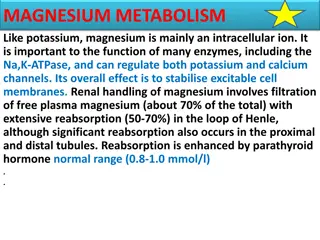The Importance of Magnesium for Good Health
Magnesium is a vital mineral essential for good health, with benefits including muscle and nerve function support, maintaining heart rhythm, and keeping bones strong. It is involved in over 300 bodily reactions and is abundant in the body, primarily in bones. Sources of magnesium include nuts, beans, grains, dairy, and green vegetables. Adequate intake varies by age and gender, with recommended daily values provided. Magnesium plays a key role in controlling blood pressure, blood sugar, insulin levels, and may lower the risk of heart disease and osteoporosis. Most individuals acquire sufficient magnesium through their diet, and supplements are generally only necessary for those with specific medical conditions.
Download Presentation

Please find below an Image/Link to download the presentation.
The content on the website is provided AS IS for your information and personal use only. It may not be sold, licensed, or shared on other websites without obtaining consent from the author.If you encounter any issues during the download, it is possible that the publisher has removed the file from their server.
You are allowed to download the files provided on this website for personal or commercial use, subject to the condition that they are used lawfully. All files are the property of their respective owners.
The content on the website is provided AS IS for your information and personal use only. It may not be sold, licensed, or shared on other websites without obtaining consent from the author.
E N D
Presentation Transcript
Magnificent Magnesium
Fun Facts Magnesium is essential for good health. According to the National Institute of Health, it is the 4thmost abundant mineral in the body. Half of magnesium is in the bones. It is needed for more than 300 different reactions in the body!
Where is Magnesium in My Body? Bones Cells of Tissues Organs
What Are the Benefits? Aides muscle and nerve function Keeps the heart rhythm steady Helps keep bones strong Boosts immune system Excess is removed from the body via the kidneys.
What Are Some Sources of Magnesium? Various Nuts Various Beans Various Grain Product Various Dairy Product Spinach and Other Green Vegetables Potato Banana Raisins
Recommended Daily Intake Intake of Magnesium Age Male Female 4 to 8 years 130 mg/day 130 mg/day 9 to 13 years 240 mg/day 240 mg/day 14 to 18 years 410 mg/day 360 mg/day 19 to 30 years 400 mg/day 310 mg/day 31 and older 420 mg/day 320 mg/day
Magnesium and Health Magnesium helps control blood pressure within normal levels. Magnesium can help in controlling blood sugar and insulin levels. Adequate magnesium level may also lower the risk for heart disease. Having enough magnesium can help increase exercise time. Adequate magnesium may also keep osteoporosis at bay.
How Do I Know I am Getting Enough? Most individuals have adequate magnesium levels. Only those with specified medical conditions may require magnesium supplements.
Mission: To promote healthier lives through research and education in nutrition and preventive medicine. The Pennington Center has several research areas, including: Clinical Obesity Research Experimental Obesity Functional Foods Health and Performance Enhancement Nutrition and Chronic Diseases Nutrition and the Brain Dementia, Alzheimer s and healthy aging Diet, exercise, weight loss and weight loss maintenance Authors: Heli Roy, PhD, RD Beth Kalicki Division of Education Pennington Biomedical Research Center The research fostered in these areas can have a profound impact on healthy living and on the prevention of common chronic diseases, such as heart disease, cancer, diabetes, hypertension and osteoporosis. The Division of Education provides education and information to the scientific community and the public about research findings, training programs and research areas, and coordinates educational events for the public on various health issues. We invite people of all ages and backgrounds to participate in the exciting research studies being conducted at the PenningtonCenter in Baton Rouge, Louisiana. If you would like to take part, visit the clinical trials web page at www.pbrc.edu or call (225) 763-3000.



























